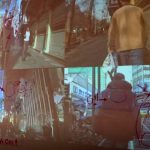Saeed is an Arabic word that is used as a special name in Farsi
In the performance of “Saeed is an Arabic word that is used as a special name in Farsi”, the most important issue was to know how human society works: how human beings get together and what kinds of relationships they create. The collective biology of human constantly leads him to the construction of society and the construction of that society always leads to the collapse of the collective human relationship. In fact, human beings are getting separated by what unites them. As Hannah Arendt, a political philosophy theorist states:
“The public realm, as the common world, gathers us together and yet prevents our falling over each other, so to speak. What makes mass society so difficult to bear is not the number of people involved, or at least not primarily, but the fact that the world between them has lost its power to gather them together, to relate and to separate them. […] To live together in the world means essentially that a world of things is between those who have it in common, as a table is located between those who sit around it; the world, like every in-between, relates and separates men at the same time”.
This performance took place in a flat industrial shed with a red floor of 850 meters. The members of the performance were fifteen people and each member had a specific subject and medium for himself: Video art, video performance, lecture performance, monologue, theater and etc., which all these ideas together formed the output of a single performance during several months. A performance with fifteen people who were like the people at the street and in a public place, standing together and using a single place without any personal interference or eventual encounters. Just as when we look at a street with all the people in it, we see human beings as a moving mass in an unconscious harmony.
All the space used by the performers were separated from the audience space by separating tapes, such as the borders set around the art works in the museum and exhibitions, but there was opportunity for the audiences who wanted to cross the borders.
Gelareh Reihani
and I participated in this project as a performer.
Razieh Aarabi


